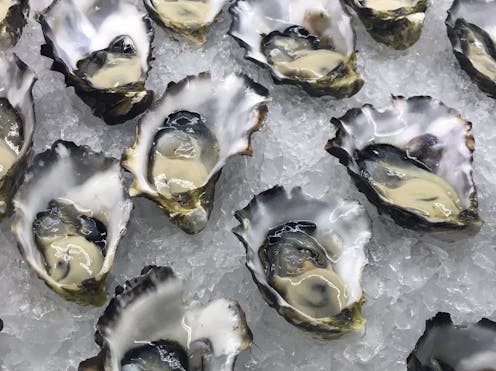5 tips to make your feast of summer seafood sustainable
- Written by Carissa Klein, Associate professor, The University of Queensland

Summer in Australia is synonymous with seafood, from fish and chips at the beach to prawns on the barbie. But how do we know if the seafood is sustainable – that is, harvested from healthy stocks with minimal negative environmental impacts?
More than one third of the world’s fisheries are being harvested at unsustainable levels according to the latest figures[1] from the UN’s Food and Agriculture Organisation.
Research shows public awareness of the problem is growing[2]. But 62% of the seafood[3] Australians eat is imported, which can make it hard to determine the food’s provenance.
While comprehensive sustainable seafood guides like the Australian Marine Conservation Society’s Good Fish[4] are readily available, we know some people find them daunting and time-consuming to use. To make it simpler, we’ve put together five tips for better seafood-buying, focusing on holiday favourites.
Read more: What are you really eating? How threatened ‘seafood’ species slip through the law and onto your plate[5]
5 ways to ensure you’re buying sustainable seafood this summer
Eat farmed Australian prawns. Much intensive prawn farming overseas has been linked[6] to the destruction of coastal habitats, and some Australian wild-caught prawns[7] have bycatch issues, meaning rare species like dugongs and turtles are accidentally caught by trawling. By contrast, Australian prawn farming is done in tanks on land, often making it a more sustainable industry[8].
Eat wild-caught Australian rock lobster. This year, lobster prices are much lower[9] than usual due to export issues. Australia’s rock lobster fisheries are generally sustainably fished[10] as opposed to imported lobster.
Eat farmed Australian oysters and mussels. It’s hard to go wrong here – fresh local oysters and mussels are widely available in stores and restaurants and are usually sustainable. Imported options are not widely available and usually tinned.
Eat farmed Australian barramundi. Locally farmed barramundi is the most commonly available sustainable fish species. Some wild-caught Australian barramundi fisheries have issues with bycatch[11] while imported farmed barramundi have recurring issues[12] with disease.
When in doubt, pick fresh Australian seafood. Australian fisheries are better managed[13] than most others around the world, making local fish usually the better choice.
Data taken from the Good Fish Guide.
What to watch out for
My team and I recently examined[14] more than 50,000 seafood products from southeast Queensland supermarkets, restaurants and other outlets and found only 5% could be classed as sustainable.
If you’re buying seafood to cook at home, you’re most likely to find sustainable options at speciality seafood outlets, which we found were more likely to stock Australian products. While some sustainable options are available in major supermarkets, they skew much more heavily to imported seafood.
Read more: Like eating fish? It's time to start caring where it comes from[15]
We know there are a lot of salmon lovers out there - it was the most commonly found seafood product in our survey. Nearly all salmon sold in Australia is farmed Atlantic salmon produced in Tasmania. Unfortunately, this salmon is currently classified[16] as “Say No” by the Good Fish guide due to significant environmental impacts.
On a positive note, the Tasmanian salmon industry is working to address[17] these well-documented problems and the potential for improvement is high. It’s worth checking sustainable seafood guidelines frequently, as sustainability changes over time.
The Good Fish guide lists more options[18] such as sustainable abalone (wild and farmed), mullet, mudcrabs and whiting.
What about eating out?
Australia has no regulations requiring origin and species labels on cooked seafood. That means that when you buy flake, it could actually be a critically endangered species like the hammerhead or school shark.
This is not a problem we can solve as individual seafood lovers. A 2014 Senate inquiry found the exemption for cooked seafood should be removed[19], but it did not become law.
To fix this, the government should introduce laws to improve seafood transparency and sustainability, especially in restaurants and cafes. This would make Australia world leaders in this area, given many major countries do not have mandated country-of-origin labelling for cooked seafood.
While we work towards a national solution, it’s important we vote with our wallets to buy sustainable seafood wherever possible. This will encourage the industry we want to see and avoid unnecessarily trashing our oceans.
Tia Vella contributed to this article
References
- ^ latest figures (www.fao.org)
- ^ growing (onlinelibrary.wiley.com)
- ^ 62% of the seafood (www.awe.gov.au)
- ^ Good Fish (goodfish.org.au)
- ^ What are you really eating? How threatened ‘seafood’ species slip through the law and onto your plate (theconversation.com)
- ^ has been linked (www.globalseafood.org)
- ^ some Australian wild-caught prawns (goodfish.org.au)
- ^ more sustainable industry (www.csiro.au)
- ^ are much lower (www.abc.net.au)
- ^ sustainably fished (link.springer.com)
- ^ issues with bycatch (goodfish.org.au)
- ^ recurring issues (www.frontiersin.org)
- ^ better managed (journals.plos.org)
- ^ examined (www.preprints.org)
- ^ Like eating fish? It's time to start caring where it comes from (theconversation.com)
- ^ currently classified (goodfish.org.au)
- ^ working to address (nre.tas.gov.au)
- ^ lists more options (goodfish.org.au)
- ^ should be removed (www.aph.gov.au)

















